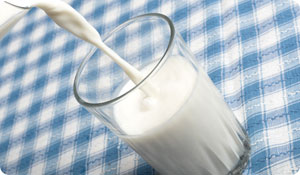
Are you allergic to milk? It may be too late to change this fate, but according to researchers from Tel Aviv University in Israel, it could be possible to help eliminate this danger for your newborn baby with one simple step .
Milk Protein Allergy
Milk allergies are particularly common among children. While some of them will outgrow it as they age, some will continue to have this allergy into adulthood and may be at risk for a serious or even life-threatening reaction.
However, the Israeli researchers discovered that milk protein allergies could be entirely prevented when a baby is exposed to cow's milk within the first 14 days of life. Be sure to talk to your doctor if you are thinking about taking this step.
Surprising Findings
The groundbreaking finding was included in the Journal of Allergy and Clinical Immunology in July 2010, but this study goes against the current grain of advice of the World Health Organization (WHO) and other respected public health groups. Up until now, these experts have advocated that babies should be exclusively breast fed for the first six months of life or longer whenever possible. This is because breast milk has been found to give babies the healthiest start to life.
While the benefits of breast feeding are still significant, the Tel Aviv scientists feel that supplementing breast milk with cow's milk, during an infant's first 14 days will offer the best of both scenarios. The researchers came to this conclusion after studying data from 13,000 children. They noted that those who had cow's milk exposure within the first two weeks of life seemed to completely avoid the risk of later developing a milk allergy. These researchers also say that even babies who were exposed to milk after that time period still reduced their risk by 19 percent.
Benefits of Early Exposure
The study scientists believe the reason for the benefit of early exposure to cow's milk is that it helps the body build up immunity in the same way vaccines provide protection against certain allergies.
What This Means for You
If you have a brand new baby, or expect to have one sometime in the near future, these findings can play a big role in shaping your newborn's feeding habits. However, keep in mind that breast milk does have many essential health benefits, so you'd never want to replace breastmilk with cow's milk.
There also isn't enough conclusive evidence yet about exactly how much cow's milk is needed for this protective effect. Some pediatricians suggest starting at birth with one bottle of cow's milk a day. Even if you have an older baby who is breastfed, it may still be worth adding some cow's milk into her diet. Be sure to talk to your doctor before taking these steps.
It's also important to understand that although many people believe they are allergic to milk, scientists now believe that having a true milk protein allergy is not as common as they had previously thought. Therefore, if you have any concerns about the risk for yourself of for your child, it's important to talk to your doctor and if needed, consider allergy testing to see if any real danger exists and if so, to determine how to handle the situation.
Sources:
American Friends of Tel Aviv University
http://www.aftau.org/site/News2?page=NewsArticle&id=12547
Journal of Allergy and Clinical Immunology (JACI)
http://www.jacionline.org/article/S0091-6749(98)70286-6/abstract
World Health Organization (WHO)
http://www.who.int/child_adolescent_health/topics/prevention_care/child/nutrition/breastfeeding/en/index.html





